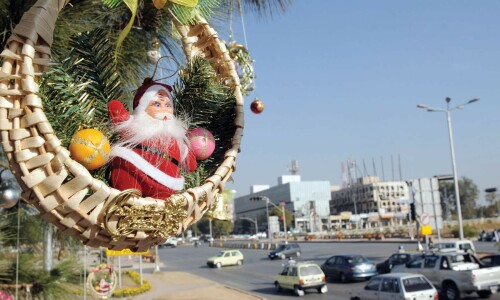
“We have come here from Thatta by bus and are headed to Faisalabad by train,” said Akram Ali, waiting at platform number one at Karachi Cantt Station since early morning for the Pakistan Express. “It is expected to leave at around 1.30pm from here but hasn’t even arrived as yet,” he added. Delayed and cancelled trains are nothing new for passengers.
While Railways ministers come and go, Pakistan Railways has remained off the priority list of all governments. Malpractices and corruption by its employees brought railways towards its sorry state of affairs. At present, non-availability of locomotives due to lack of timely maintenance and negligence has reduced passenger train operations by about 60 per cent and that of freight by 90 or so.
Former minister of state, Ishaq Khan Khakwani claims that railway authorities are forced to allow stoppages at the stations falling in the constituency of influential politicians or to run a passenger train there. “The government is more interested in developing road infrastructure which requires constant repairs and serves their vested interests, while rail track maintenance is comparatively economical,” maintains Mr Khakwani who retired as a divisional engineer of Pakistan Railways.
Introduction of the National Logistic Cell during the Afghan war and subsequent focus of the decision-makers on development of road network deprived the railway of its freight earnings, considered the lifeline for railways all over the world. “Transporting goods and freight by railways is very economical, compared to road. One rail line can transport as much cargo as a 20-lane highway can. One locomotive can pull 70 wagons, each weighing 22 tons, while a truck would carry only eight tons,” Khakwani argues.
During the 1990s, no investment was made to upgrade the infrastructure or rolling stock. From May 1995 to February next year, all resources were diverted to upgrade the Khokhrapar-Monabao track to revive a second rail link with India by operating one passenger train in a week.
“Both moveable and immovable assets are kept to bare minimum requirements, addition in assets is preferred over replacement of dilapidated ones and condemned or inactive assets are disposed of while operation and maintenance of assets are outsourced to save expenditure on overhead charges,” says Muhammad Iqbal Khatri, a retired additional general manager of railways and a member of the Chartered Institute of Logistics and Transport, Pakistan.
“More upcoming projects like increase in the locomotive fleet from 520 to 657 (according to PC-1 for Procurement of 150 Locomotives), rail link between Gwadar and Quetta, Peshawar and Jalalabad (Afghanistan), etc., also need reconsideration in view of the lack of back-up maintenance facilities, very little business and revenue generation,” he adds.
The Federal Investigation Agency had in March 2010 unearthed a scam involving senior officials in the sale of railways scrap. The tenders were the biggest in Pakistan Railways history as one was for the sale of 21,000 tons of scrap while the other was for the sale of 18,000 tons of scrap. At present, the National Accountability Bureau is investigating this matter as well as the case related to alleged fraudulent allotment of railway land to a golf club in Lahore. If matters were not bad enough, three retired general managers of the Pakistan Railways are in NAB custody for allegedly playing a key role in the purchase of spare parts for 69 Chinese locomotives.
But the woes of Pakistan Railways cannot be laid solely at the doors of the senior officials; the low-paid employees also have their role — ticket examiners pocketing one-third fare and allowing travel in trains, employees stealing material from stores and yards, booking clerks under-invoicing cargo and parcels. Theft of locomotives’ radiators and diesel and disappearance of a wagon full of copper wires are the recent instances which were not possible without the connivance of the low-paid employees. Authorities do try to address these issues: on a directive of the Supreme Court, Railways launched a country-wide campaign in February this year to retrieve its land from illegal occupation; action is also taken against commuters travelling in trains without tickets from time to time.
“The guy at the window will say that the tickets are all sold out but his tout will be selling them in black on the platform,” revealed a source at Karachi Cantt Station. “On the platforms, there are hardly any facilities provided to the commuters. And it is deliberate so that not finding any water, they are forced to buy juices and cold drinks so that the tuck shops do well and give something back to the officials in charge here,” he added.
Akram Ali, a frequent traveller explains the price structure of tickets, “If I buy the ticket from the guard after boarding the train it will cost Rs1,400 but getting it from the platform will cost Rs1,020. And if I buy it in black, it will be Rs2,000.”
The trains are running to full capacity so why is Railways still going in loss? The answer to this dilemma is clear and each one of the officials appears united in their reply. “The major earning for the Railways came though the cargo trains but they are no longer running,” said one of them.










































